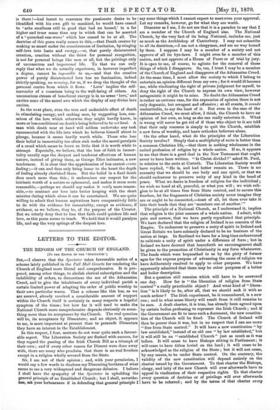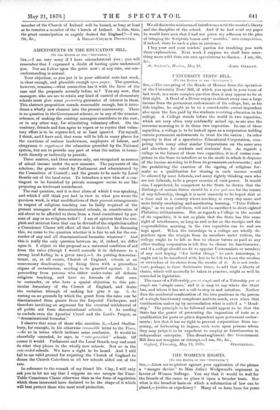LETTERS TO THE EDITOR.
THE REFORM OF THE CHURCH OF ENGLAND. To THE EDITOR OF TIIE SPECTATOILl SIR,-I observe that the Spectator takes favourable notice of a scheme lately published in the Pall Mall Gazette for rendering the Church of England more liberal and comprehensive. It is pro- posed, among other things, to abolish clerical subscription and the indelibility of orders, to discontinue the use of the Athanasian Creed, and to give the inhabitants of every individual parish a certain limited power of adapting the order of public worship to their own particular wants. That a scheme like this has, as we are assured, already received a considerable amount of support within the Church itself is certainly in many respects a hopeful symptom of the times ; but how far it will tend to make the National Church more comprehensive depends obviously on some- thing more than its acceptance by the Church. The real question will be, its acceptance by Dissenters ; and no object, it appears to me, is more important at present than to persuade Dissenters they have an interest in the Establishment.
In this respect, I fear, matters do not wear quite such a favour- able aspect. The Liberation Society are flushed with success, for they regard the passing of the Irish Church Bill as a triumph of their own ; and if every other reason for Dissent were done away with, there are many who proclaim that there is no real freedom except in a religion wholly severed from the State.
Sir, I am not of their opinion ; and, with your permission, I would say a few words to disabuse my Dissenting brethren of what seems to me a very widespread and dangerous delusion. I believe 1 shall have the sympathy of the Spectator in upholding the general principle of an Established Church ; but I shall, neverthe- less, ask your forbearance if in defending that general principle I
say some things which I cannot expect to meet even your approval. Let my remarks, however, go for what they are worth.
Dissenter as I am, I do not see that it is a paradox to say that I am a member of the Church of England also. The National Church, by the very fact of its being National, includes me, just as much as the Archbishop of Canterbury. I may not subscribe to all its doctrines,—I am not a clergyman, and am no way bound by them. I suppose I may be a member of a society and not approve of all its bye-laws. I might even be a member of this nation, and not approve of a House of Peers or of trial by jury. It is open to me, of course, to agitate for the removal of those things of which I disapprove. So, too, I trust I may be a member of the Church of England and disapprove of the Athanasian Creed. At the same time, I must allow the society to which I belong to entertain an opinion different from my own ; for it would ill become me, while vindicating the right of private judgment for myself, to deny the right of the Church to express its own view, however antagonistic it might be to mine. No doubt the Athanasian Creed is rather an extreme case, for the expression of opinion, there is not only dogmatic, but arrogant and offensive; at all events, it sounds uncharitable, to say the least of it. But even in the case of the Athanasian Creed, we must allow, I think, the Church to have an opinion of her own, so long as she can really entertain it. What is wrong will never be got rid of if those who object to it are told that their only resource is simply to quit the Church, establish a new form of worship, and leave orthodox believers alone.
On the other hand, what do the principles of the Liberation Society involve? Simply that a multiplicity of sects is better than a common Christian life,—that there is nothing wholesome in the united profession of religion by a whole nation. If so, it appears to me that there is a good deal in the New Testament that ought. never to have been written. "Is Christ divided ?" asked St. Paul, in relation to the sects at Corinth. The Liberation Society would have replied, "He is, and had better remain so. There is no. necessity that we should be one body and one spirit, or that we should endeavour to preserve unity of any kind in the bond of peace. What we desire is freedom of religion for the individual ; we wish no bond at all, peaceful, or what you will ; we wish reli- gion to be at all times free from State control, and to secure this freedom, let the fragments of Christian society never imagine they are or ought to be connected,—least of all, let them ever take it into their heads that they are 'members one of another.'" The principle of a National Church, as I understand it, implies that religion is the joint concern of a whole nation. I admit, with pain and sorrow, that we have partly repudiated that principle. We have declared that the religion of Ireland is no concern of the Empire. To endeavour to preserve a unity of spirit in Ireland and. Great Britain we have solemnly declared to be no business of the nation at large. In Scotland we have for a longtime endeavoured to cultivate a unity of spirit under a difference of form ; but in Ireland we have decreed that henceforth no encouragement shall be given to the promotion of Christianity in any form whatsoever. The funds which were bequeathed to us by the piety of former ages for the express purpose of advancing the cause of religion we have deliberately resolved to apply to other purposes. We have apparently admitted that there may be other purposes of a better and holier description.
But a question still remains which will have to be answered one day. How far is "the liberation of religion from State control" a really practicable object ? And what kind of " libera- tion" is it likely to be, after all, that we should seek it with so much ardour ? The Irish experiment, be it remembered, is a new one ; and in what sense liberty will result from it still remains to be seen. A draft charter, it is true, has already been agreed upon by certain bodies professing to represent the Irish Church ; and if the Government see fit to issue such a document, the new constitu- tion of the Church will be fixed. The Church of Ireland will then be poorer than it was, but in no respect that I can see more "free from State control." It will have a new constitution "by law established," instead of an old one "by law established," but it will still be an "established Church" just as much as it was before. It will cease to have Bishops sitting in Parliament ; it will cease to have tithes levied on the land ; it will cease to be acknowledged as the religion of the State ; but it will not cease, by any means, to be under State control. On the contrary, the validity of the new constitution will depend entirely on the charter issued by the Government. To that charter the Bishops, clergy, and laity of the new Church will ever afterwards have to appeal in vindication of their respective rights. To that charter every question of doctrine or of privilege will ever afterwards have to be referred ; and by the terms of that charter every member of the Church of Ireland will be bound, so long at least as he remains a member of the Church of Ireland. Is this, then, the great emancipation so eagerly desired for England am,
Sir," &c., A DItOAD-CIIURCIt DISSENTER.































 Previous page
Previous page